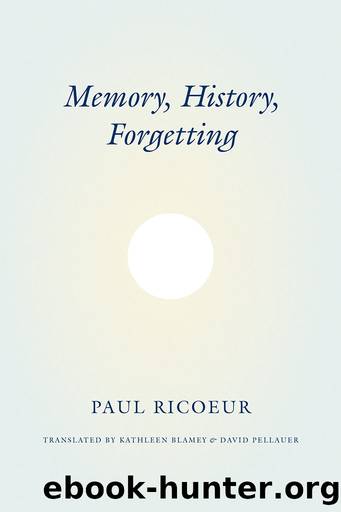Memory, History, Forgetting by Paul Ricoeur;

Author:Paul Ricoeur; [Ricoeur;, Paul]
Language: eng
Format: epub
ISBN: 9780226713410
Publisher: University of Chicago Press
Published: 2021-09-15T00:00:00+00:00
INTERPRETATION IN HISTORY
The final internal limitation affecting historyâs reflection on its own project of truth is related to the notion of interpretation, whose concept we shall clarify below. The tardy acknowledgment of the theme of interpretation in our own discourse may seem surprising: could it not have made an appearance at the time and place we took up the theme of representation and, hence, within the framework of the epistemology of the historiographical operation? Instead we have made a different semantic choice which, it seems, better serves the scope of the concept of interpretation. Indeed, far from constituting, as representation does, a phaseâeven a nonchronological oneâof the historiographical operation, interpretation belongs instead to the second-order reflection on the entire course of this operation. It draws together all the phases, thereby underscoring at one and the same time the impossibility of the total reflection of historical knowledge on itself and the validity of historyâs project of truth within the limits of its space of validation.
The amplitude of the concept of interpretation is still not fully recognized in a version that I consider to be a weak form of self-reflection, one ordinarily placed under the heading of âsubjectivity versus objectivity in history.â53 It is not that this approach lacks justification; but it remains vulnerable to the charge of psychologism or sociologism, when it fails to situate the work of interpretation at the very heart of each of the stages of historiography. What indeed is underscored, in the canonical vocabulary of âsubjectivity versus objectivity,â is, on the one hand, the historianâs personal commitment to the process of knowledge and, on the other hand, the historianâs socialâand, more precisely, institutionalâcommitment. The historianâs twofold commitment constitutes a simple corollary to the intersubjective dimension of historical knowledge considered one province of the knowledge of others. More precisely, people of the past take on the twofold otherness of foreign and of past being, to which Dilthey adds the additional otherness formed by the mediation of inscription held to characterize interpretation among the modes of understanding: the otherness of the foreign, the otherness of past things, and the otherness of inscription join together to determine historical knowledge within the Geisteswissenschaften. The Diltheyan argument, which is also in part that of Max Weber and of Karl Jaspers, has found an echo in professional historians such as Raymond Aron and Henri-Irénée Marrou.
The principle thesis of Raymond Aronâs doctoral dissertation, Introduction to the Philosophy of History, carried the subtitle An Essay on the Limits of Historical Objectivity.54 It has often been received with suspicion as a result of some of its provocative expressions. The first section dealing with notions of understanding and meaning concludes with the âdissolution of the objectâ (118). This expression covers a moderate proposal: âNo such thing as a historical reality exists ready made, so that science merely has to reproduce it faithfully. The historical reality, because it is human, is ambiguous and inexhaustibleâ (118). If the personal, social, and institutional commitment of the historian is underscored, âthe
Download
This site does not store any files on its server. We only index and link to content provided by other sites. Please contact the content providers to delete copyright contents if any and email us, we'll remove relevant links or contents immediately.
The European History Highway: A Guide to Internet Resources by Dennis A. Trinkle Scott A. Merriman(503)
The Seven Wonders of the Ancient World by Michael Denis Higgins(482)
European Security in a Global Context by Thierry Tardy(477)
European Security without the Soviet Union by Stuart Croft Phil Williams(475)
The Routledge companion to Christian ethics by D. Stephen Long Rebekah L. Miles(464)
Hudud Al-'Alam 'The Regions of the World' - a Persian Geography 372 A.H. (982 AD) by V. V. Minorsky & C. E. Bosworth(405)
Get Real with Storytime by Julie Dietzel-Glair & Marianne Crandall Follis(401)
Hyperculture by Byung-Chul Han(395)
Gorbachev And His Generals by William C. Green(393)
Tibetan Studies in Comparative Perspective by Chih-yu Shih Yu-Wen Chen(389)
Governance, Growth and Global Leadership by Espen Moe(387)
CliffsNotes on Fitzgerald's The Great Gatsby by Kate Maurer(366)
The Oxford History of the World by Fernández-Armesto Felipe;(361)
How Languages Are Learned 5th Edition by Patsy M Lightbown;Nina Spada; & Nina Spada(358)
The Egyptian Economy, 1952-2000 by Khalid Ikram(357)
Oral Poetry and Narratives from Central Arabia: The Poetry of Ad-Dindan : A Bedouin Bard in Southern Najd (Studies in Arabic Literature, Vol 17) (English and Arabic Edition) by P. M. Kupershoek P. Marcel Kurpershoek(346)
The Oxford Handbook of the Incas by Sonia Alconini(337)
Europe Contested by Harold James(324)
The Hutchinson Dictionary of Ancient and Medieval Warfare by Peter Connolly John Gillingham John Lazenby(313)
